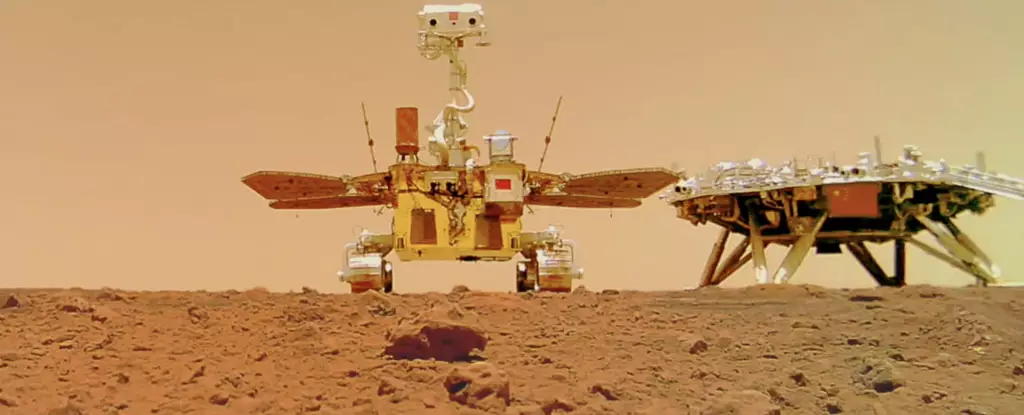The exploration of Mars has long captivated scientists and the public alike, as the possibility of past life on the Red Planet remains a tantalizing prospect. Recent findings from China’s Zhurong rover have provided new insights that support the theory that Mars once harbored a vast ocean. This report will delve into the implications of these findings, the ongoing debate regarding Martian geological history, and what it means for our understanding of life beyond Earth.
Recent studies published in the journal *Scientific Reports* celebrate the exploratory work performed by the Zhurong rover, which has been operating in the northern hemisphere’s Utopia region since its touchdown in 2021. The rover has identified several geological features in its surroundings that suggest the presence of an ancient ocean. Lead author Bo Wu from The Hong Kong Polytechnic University highlights the discovery of “pitted cones, polygonal troughs, and etched flows” as compelling indicators of past aquatic environments.
The most striking of these features may be a shoreline, which implies that substantial amounts of water once covered large swathes of the Martian surface. The researchers propose a timeline for this watery past, suggesting that flooding occurred around 3.7 billion years ago, followed by a gradual freezing that shaped the coastline we observe today. Though the confirmation of such an ocean remains elusive, the evidence collected seems to align with prior theories that have posited the existence of a vast Martian ocean.
However, significant skepticism surrounds these promising findings. Benjamin Cardenas, a researcher well-versed in Martian geology, raises concerns about the impact of environmental forces over billions of years that may have obscured or destroyed signs of an ancient shoreline. Cardenas points out that while the Martian surface may appear dormant when compared to Earth, it has indeed undergone significant geological activity that could dismantle remaining evidence of past bodies of water.
He argues that the winds on Mars could have exerted considerable pressure on sediments and rocks, causing erosion that might effectively erase any signs of a coastline. The geological clock of Mars has not been static; erosive forces might wear down critical evidence, thus complicating efforts to draw definitive conclusions about the planet’s hydrological history.
While the Zhurong rover’s findings contribute valuable data to the ongoing discourse, Wu emphasizes that the findings do not afford a conclusive proclamation of an oceanic existence on Mars. The quest to definitively prove this theory may hinge upon future missions capable of retrieving Martian rock samples for comprehensive analysis back on Earth.
Retrieving samples from Mars would provide a clearer understanding of the planet’s geological history and hydrology. As researchers continue to navigate the complexities of Martian geology, the focus remains on understanding how water influenced the planet’s evolution and whether it ever fostered conditions suitable for life.
The ongoing examination of Mars’s geological features reaches beyond Martian inquiry—it probes at the heart of astrobiology and our understanding of life within the universe. Cardenas suggests that understanding Mars’s watery history could shed light on the conditions necessary for life as we know it. The prevailing hypothesis regarding life on Earth posits that it originated in the oceans or near tidal pools, environments rich in the necessary components for biological processes.
The key takeaway remains that regardless of the debate surrounding the existence of an ancient ocean on Mars, the truth lies in unraveling these mysteries to answer a pivotal question: Is Earth the lone habitable body in our solar system? As researchers continue to examine evidence and theories surrounding Martian hydrology, they inch closer to understanding whether life elsewhere is a distinct possibility.
While the Zhurong rover’s revelations spark excitement about Mars’s past, skepticism about these findings reminds us that science often thrives on debate and inquiry. As we delve deeper into the Martian narrative, we approach the larger existential question about life in our universe, pushing the boundaries of what we understand about our immediate cosmic neighborhood.

